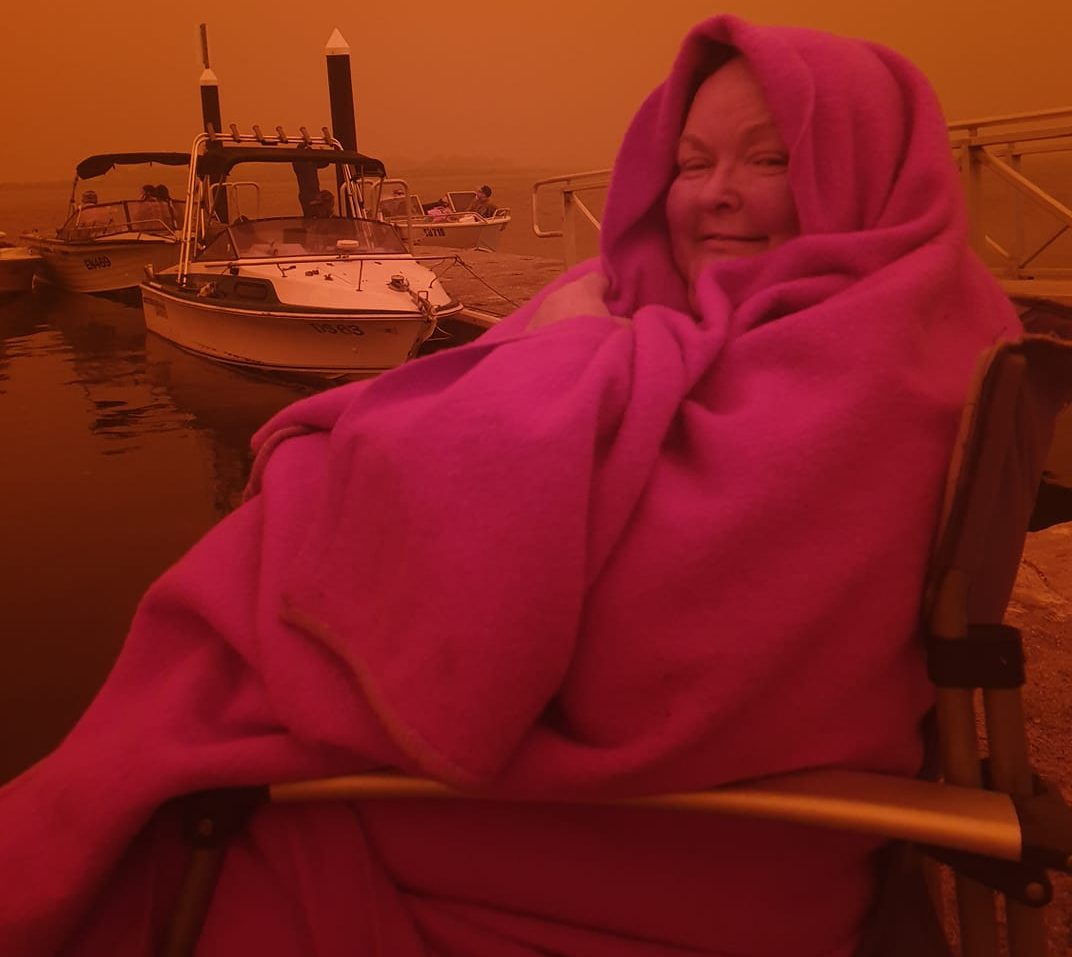
Bushfire at Mallacoota
Our Bush Chaplain, Rev. Rowena Harris recounts her days spent on the beach with the Bushfire at Mallacoota where she and 4000 others were cut off from the rest of the world by fire. These are her words.
Some folk have peaceful Christmases and joyous New Years. I usually do. But not this time. And so the story of my Christmas adventures? It was unusual, scary and weird. What more can I say?
As a minister at Swifts Creek Uniting, we had decided not to have a service on the 25th as too many folk were away, and so I accepted my friends’ invitation to their farm in Mallacoota. When we were advised to vacate Swifts Creek because of fire, on the 20th, it made sense that I flee to them, early. I had a suitcase packed, so the 15 minute timeline authorities gave seemed ok by me. It was scary, but exciting. And so, I fled.
Christmas was great – friends, children, puppies, presents, good wine and prawns! We were concerned about the situation at Swifts, but things were stable.
Preparing for evacuation
On New Year’s Eve, my host who was also an ex-cop, came to the breakfast table with bad news. The local fire situation wasn’t good. And the only road in and out would be closed shortly.
He knew how to keep us safe and we were ok in town. We filled the trailer and our three cars with packed suitcases, blankets, food and water, and special family treasures. We discussed the town plan; to go to the beachfront and stay as long as needed, to take blankets to shelter under water, while keeping heads above, for protection from flaming, flying embers. We were as calm as possible, what with my hosts’ children and our own fears. At lunch, we heard that flames were due in about 10pm. We sat, waited, told jokes, ate Christmas cake, and worried. Then at 4pm, our phones rang simultaneously, the emergency voice telling us to…
“…go to the beach RIGHT NOW”
I was the first to leave the farm, along with Miss 11, a puppy, a rabbit, eight guinea pigs and four goldfish. Miss 11 put her hand over mine on the steering wheel and held it tight. She informed me in a tiny voice that clearly I was frightened and holding her hand would make me feel better.
We joined 500 cars parked on the cement foreshore area, and found the other two cars from the farm. We unpacked and ordered pizza. It was a bit like camping.
At dusk, we sorted out which car we would sleep in. The police report said the fires were now due in the morning, but nobody was allowed out of the beach car park.
Cate and I slept in my car. Years since either of us had had a sleepover, we giggled and told secrets. We slept on and off, and waited for dawn…
…but dawn never came
Some time the next morning, we woke up in darkness. It was cold. There were no birdsongs. It was eerie.
We expected the sun at some point, but we never saw it. Breakfast was rushed. As we were finishing sirens went on loudly. It was a sign to take blankets and other necessities down to the shore, to sit and wait for the fire. And so we did.
Mind you, we had time enough for my hosts to slip over for coffee from the café just before it closed. It was a welcome, warming, normal thing.
We had not long to wait until the sky changed colour…and we saw a wall of red rush towards the town. It was starting.
Our family group sat together. My host Mark checked that we knew what to do; if flaming embers blew down over us we get in the water and under the blankets. Cate asked me to give a first aid class about my asthma. Then we wrapped ourselves in blankets up against the chill. And then we watched the Bushfire at Mallacoota.
“We watched in horror.”
The red wall moved closer. Sirens wailed. Winds howled. And the sky varied between shades of red and black. Then a collective gasp as the first explosions rang out – gas bottles in homes. With each explosion, flames went high as houses blew up. We watched in horror.
Some of us realised that the children were beginning to freak out, as indeed were the adults, so we played ‘eye spy’ with red and black objects. We did ‘peek-a-boo’ with a little girl. We discussed theology. Do goldfish have souls? (we think they do).
Occasionally, Cate’s hand reached for mine or little Jess moved close to us, explaining that we felt less afraid if she was near. A kind lady gave us cold spaghetti sandwiches, which was weirdly welcome in that cold, red atmosphere. We looked sad, she thought, and deserved a treat. Mark shared out water bottles. And we watched as the red wall grew closer and higher.
Safe but afraid
Two fire engines stayed with us in the car park, and more drove in and out to a big pump down by the sea wall, replenishing water. Police cars drove round us. We were warned to not go back to the cars, in case they exploded.
In many ways we knew in our heads that we were safe, but my heart was afraid. I remember thinking at one stage that, of course, my faith was strong. I prayed aloud and silently, but jeez, I was scared.
It was a long day watching the red wall, wrapped in blankets and wondering what the worst would be. Occasionally, folk would cry out as they realised the likelihood of their homes going.
But we laughed a bit too. Silly, black humour jokes; someone’s birthday, a reminder that it was NYE; a wallet that fell out of a pocket at the jetty and its funny rescue.
But there was always the wind, the sky, the explosions, and the red flames. By about 3pm, the sky turned a milder pink. We were told we could return to our cars for a rest, that there were no burning embers. We were thankful. Cars meant a more comfortable rest and quieter chats. And that children could sleep.
By 5pm they let us go. The fire was burning but it had gone on through town, to the hills beyond. The police worked out the best way to deal with 500 cars and 5000 people. My hosts left before myself and the children as they wanted to see their home as soon as possible.
The aftermath
The kids and I drove up the main street. No damage there. But then, when we turned the corner, we shared a collective gasp of horror. This was not the Mallacoota we knew. We cried all the way home.
So, how do I finish? Well, no deaths or injuries, and that was a blessing. My host’s farm minimally damaged but both liveable and repairable. Their big animals survived the flames. Trees, fences and grass were gone, but around 100 homes were burnt.
Much of the park was gone. All that infrastructure. No water for a day. No power for weeks. The only road in and our cut-off. Some help arrived via a random boat out at sea, then the arrival of more of the usual help. And then the armed forces.
My asthma was well-behaved but qualified me for a medical evacuation. Two weeks after that terrible Tuesday, I flew out in a Chinook helicopter to Sale. It was exciting enough but due to a seat miscount, I was the only passenger, so it felt super-exciting.
There are signs of traumatic stress. But there was also the camaraderie, the hugs and the shared giggles. Meaningful relationships that matter.
“…we had looked at the very face of hell, and survived.”
And so now, almost a month later, I am on special paid leave in Melbourne, staying with friends. My car enjoys an extended vacation in Mallacoota as roads are cut, but it may be set free later this week. I will see a church counsellor to make sure I am coping ok. Mostly, I am.
The goldfish died, stuck in my car. Jess was so sad. I guess it is easier to cry for fish, than to cry for the enormity of loss from the Bushfire at Mallacoota.
And then I remember folk shouting out that they would not let the fire win. That they would beat the bastard, and the town would be reborn! And we did, and it will.
I remember thinking that God was with us and that we had looked into the very face of hell and survived. We survived! We can do anything.
And I believe those goldfish went to heaven, because Jess and I decided this was most likely. In the midst of hell, we held hands and believed that God loves all things like us…and goldfish.
Rev Rowena Harris
Bush Chaplain, High Country Remote Area
Minister, Swifts Creek Uniting Church
We are grateful for those who responded to our Bushfire Appeal. Your support brings trauma counselling and emergency relief to families who have lost their homes. Thank you.
This article is adapted from the February 2020 edition of Frontier News.


